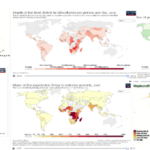TECCHI’S final webinar in the Sustainable Development Goals (SDGs) series was focused on leaving nobody behind. “Leaving no one behind” a phrase commonly used in the global health and international development sectors was unpacked during the webinar, with a focus on how it relates to the field of evaluation. The topic was examined from multiple points of view with some speakers focused on the importance of understanding local contexts and power dynamics while trying to ensure that nobody gets left behind. Another speaker approached the topic from a different lens, by describing how the burden to sustain interventions is often placed on countries that are impoverished and likely lacking in capacity to sustain program outcomes. She debated whether or not “leaving nobody behind” is a reasonable goal to have given the political and economic structures that currently govern our world. This blog post will focus on the dialogue taking place between the webinar participants who engaged in discussions through Zoom’s chat feature. Below is a list of some comments that stood out to me from the conversation:
| “The point being raised about trying to understand different perceptions is equally valid in developed economies eg in evaluating programmes for sex workers or drug dependents and possible non uptake of services provided – equally need to search for their understandings and reasons of why there is no take up” |
| “Why should be burden the community? can [we] have a model where the state is held accountable for services that are sensitive to social and cultural realities.” |
| “Prettiness of no one left behind isn’t matched” |
| “Finally, we don’t fund, design, implement, monitor or evaluate for sustainability or consider longer-trajectories post-project. Those are seen as the problems of the countries themselves…. who are poor enough to qualify for aid and often powerless and capital poor who can’t sustain multi-million dollar outcomes… Just a warning, ‘complexity’ can be hidden behind – it’s too complex to address, no?” |
| “I do think the methodologies and methods exist, but are not applied i.a. because of the political economy of evaluation, and of development.” |
The first comment talks about the need to understand contexts and power dynamics from the participant’s perspective. While there is a growing realization of the importance of contextual considerations while developing, implementing and evaluating programs, it is important to be reflexive about our position and humble about our contextual knowledge (and lack of it). When working in the international development field there is a lot one might not know with regards to the context they’re working in, and it’s critical to seek out knowledge from program participants and other local actors to understand their perspectives about a given program and how it fits into the fabric of the local community. This comment also reminded me about a striking observation that Dr. Das made during the webinar. He hinted at how the field of development often attempts to fit a poor person into the western “modern” perspective. In his presentation, he talked about the promotion of institutional delivery in Odisha. While the program being implemented defined success as an increase in the number of women giving birth in an institutional facility, it didn’t take into account the fact that many of these same women didn’t even have proper houses to live in.
While the second comment is intriguing, I have to kindly disagree with this statement (“Why should be burden the community? can [we] have a model where the state is held accountable for services that are sensitive to social and cultural realities”). While it is important for states to have policies and frameworks that take into account social and cultural realities, it is also important for individuals at the community level to play a role in developing programs that are sensitive to their needs. Subsequently, actors at the local level also need to be held accountable to the promises that they make. Operating at the community level enables an organization to build intimate connections with those whose needs they’re serving, and consequently get a pulse on what reality is like from the program participant lens. It enables one to occupy a unique position where you do have the opportunity to listen with humility and lead change that is sensitive to the local context.
Another comment that arose from the discussion is the need to acknowledge the systematic confines that program implementers and evaluators are working within. This includes the fact that funding cycles are generally short-term and often narrowly focused on impacts from the funders’ perspective. Given these circumstances, there might be a failure to acknowledge the work done in obscurity before empirically measurable impacts can be observed. In some cases, this fixation on achieving impacts can hinder experimentation, as the room for failure is very small, and taking risks through experimentation could lead to outcomes that are less than optimal.
While “leaving nobody behind” is extremely important from a human rights perspective, we are aware that our reality is a stark contrast, with inequities growing deeper and the poor being stuck in a vicious cycle that is hard to break through. Given that our words don’t align with our reality, and our inequities are deeply embedded in economic and political systems, how do we work towards reconciling this difference?




Leave a Reply